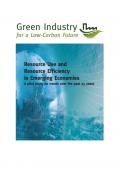This report reviews the economic and environmental consequences of resource inefficiency in Asia and the Pacific and some of its underlying causes. It examines a range of technical, policy, and institutional responses to encourage corporations and consumers alike to adopt more resource-efficient behaviors, with particular attention to the vital role governments must play in creating incentive structures, encouraging research and development for new technologies, improving institutions and information exchange, and other measures to move the region’s economies toward greater resource efficiency. This analysis is a contribution to the global G8 3R Initiative, which seeks to promote the “reduce, reuse, recycle” approach to waste management. While many of the specific strategies described are not new, the report should contribute to an understanding of the underlying reasons behind resource inefficiency, tools for its analysis, and specific interventions tailored to the Asia and Pacific context.
The report includes case studies from China, India, Japan, Lao, Nepal, Philippines and Thailand.
This publication, by UNEP, aims to identify the challenges faced in attempting to decouple human well‐being from resource consumption and exists as the first report amongst many investigations into decoupling which will be undertaken by the International Resource Panel and UNEP over the next few years. The report offers facts and statistics of natural resource flows and trade globally and notes that consumption of natural resources is still rapidly rising. A series of country wide case studies (Germany, South Africa, China and Japan) are presented that examine the decoupling potential of the countries in question. The report observes that developed countries appear to show stabilisation of resource and energy consumption however these economies appear to have exported the more energy and resource intensive elements elsewhere. There appears to be some success of relative decoupling (where resource intensity per unit growth falls) in developing countries but resource consumption in these economies is ‘steeply on the rise’.
Fostering sustainable industries and industrial development requires the use of effective indicators. Though a multitude of indicators exist, their applicability to sustainable industries remains largely unaddressed to date. In the RISI project, Ecologic Institute reviewed the available scientific knowledge in order to evaluate existing indicators and propose recommendations concerning their usability and the potential need for further indicator development. Ecologic Institute has now published a shorter version of the project results as a Ecologic Brief with forewords by Heinz Leuenberger, Director of UNIDO’s Environmental Management Branch (EMB), and R. Andreas Kraemer, Director of Ecologic Institute.
The Ecologic Brief is tailored specifically to the information needs of political decision-makers and experts in industrial resource efficiency.
The Ministry of Economy, Trade and Industry (METI), the Government of Japan and UNIDO organized the Tokyo Green Industry Conference (TGIC) 2011 on 16-18th November 2011 at the Tokyo Big Sight Conference Centre in Tokyo, Japan. The TGIC aimed to highlight the availability of environmental and resource conservation techniques and practices that are good for business, environment and climate, employees, communities and consumers. The TGIC provided a platform to discuss policy and business solutions for achieving the widespread uptake of today’s proven techniques and technologies and for enabling innovation to deliver longer term solutions that would enable even greater reductions in resource use and pollution intensity. Through related activities organized in collaboration with the INCHEM 2011 environmental technology exhibition, TGIC also provided opportunities to match environmental technology needs of participating developing countries with the international supply of Best Available Techniques (BAT) and Best Environmental Practices (BEP).

This report examines patterns and trends in resource use and resource efficiency in 16 selected emerging economies between 1985 and 2005. In order to facilitate comparison, the authors divided these countries into three different groups according to their dominant strategy of economic development since 1985: resource-based economies with a high ratio of raw materials in exports, including Algeria, Argentina, Brazil, Chile, Morocco, Russia and South Africa; industry-based economies which have been expanding their capacity to produce manufactured goods and related services, including China, Costa Rica, Malaysia, Mexico and the Republic of Korea; and services-based economies that have largely based their development since 1985 on services (e.g. tourism, financial or knowledge-based industries), including Barbados, Egypt, India and the Seychelles. While none of these three development paths is exclusive, they are useful categories for analytical purposes, as each is linked to specific physical or material profiles in terms of resource use and resource productivity.
